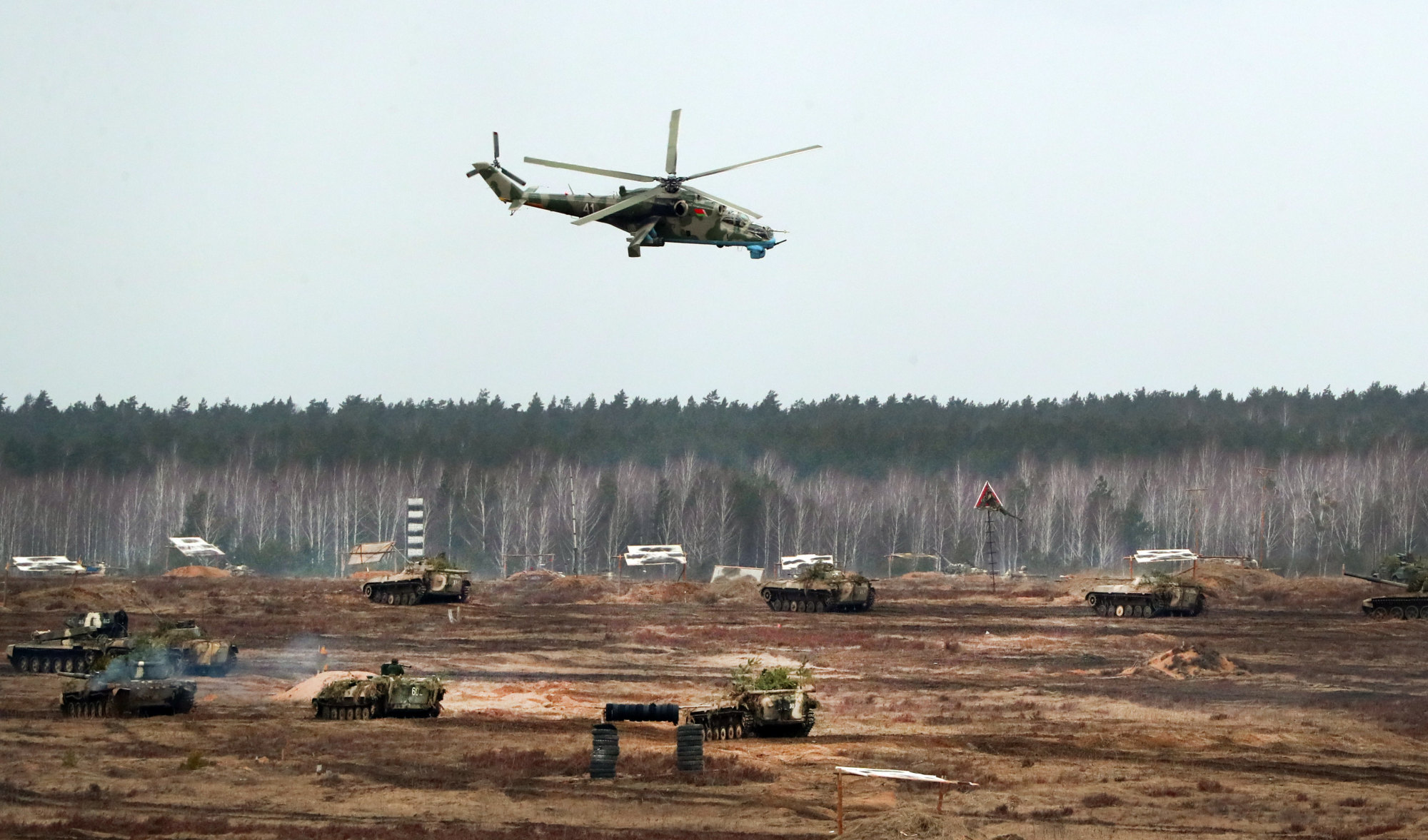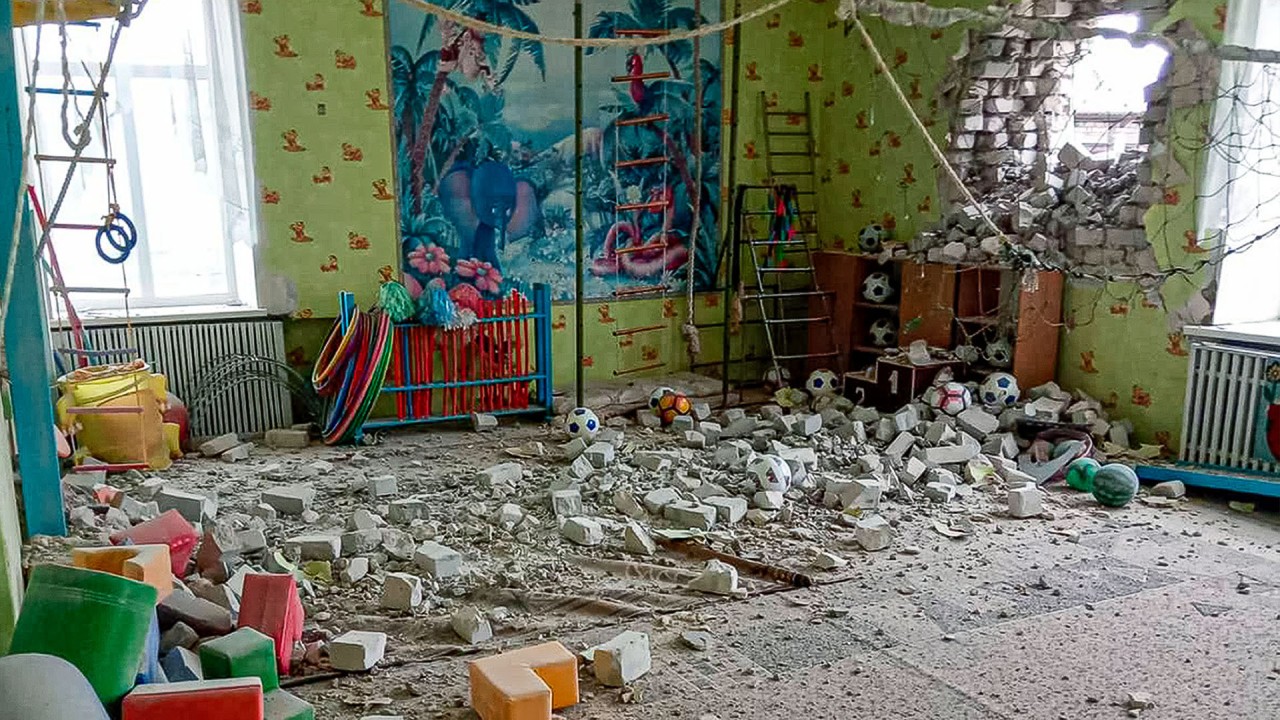
Russia, Belarus extend military drills near Ukraine as the West makes last-ditch efforts to avert conflict
- The move will be seen as a further tightening of the screws on Ukraine, already facing increased shelling from Russian-backed separatist rebels
- French President Macron and Putin agreed in a phone call on ‘the need to favour a diplomatic solution to the ongoing crisis’
In a phone conversation lasting 105 minutes on Sunday, they also stressed on “the need to favour a diplomatic solution to the ongoing crisis and to do everything to achieve one”, it said, adding that both countries’ foreign ministers would meet “in the coming days”.
Moscow had previously said the 30,000 troops it has in Belarus were simply carrying out readiness drills with its ally, which would be finished by February 20, allowing the Russians to head back to their bases.
Putin launches nuclear drills with missiles as Ukraine tensions soar
The move will be seen as a further tightening of the screws on Ukraine, already facing increased shelling from Russian-backed separatist rebels and a force of what Western capitals says is more than 150,000 Russian personnel on its borders.
It will also be seen as a rebuff to efforts by leaders like Macron and Germany’s Chancellor Olaf Scholz to urge their Russian counterpart to pull back from the brink of war.
More bombardments were heard by AFP reporters overnight close to the frontline between government forces and the Moscow-backed rebels who hold parts of the districts of Lugansk and Donetsk.
The Moscow-backed separatists have accused Ukraine of planning an offensive into their enclave, despite the huge Russian build-up on the frontier.
Kyiv and Western capitals ridicule this idea, and accuse Moscow of attempting to provoke Ukraine and of plotting to fabricate incidents to provide a pretext for a Russian intervention.
“Russian personnel and special services are planning to commit acts of terror in temporarily-occupied Donetsk and Lugansk, killing civilians,” alleged Ukraine’s top general Valeriy Zaluzhniy.
“Our enemy wants to use this as an excuse to blame Ukraine and move in regular soldiers of the Russian armed forces, under the guise of ‘peacekeepers’,” the chief of staff said.
The rebel regions have made similar claims about Ukraine’s forces and have ordered a general mobilisation, while staging an evacuation of civilians into neighbouring Russian territory.
Biden convinced Putin has decided to invade Ukraine, says Kyiv likely target
Officials with the Lugansk rebels claimed on Sunday they had repulsed an attack by Ukrainian forces that had left two civilians dead, but the Ukrainian interior ministry immediately denounced the claim as an “absolute fake”.
Russian investigators said they had opened a probe into the alleged incident.
Russia, according to Western leaders, has more than 150,000 troops along with missile batteries and warships massed around Ukraine, poised to strike.
“The plan that we are seeing is for something that could be really the biggest war in Europe since 1945 just in terms of sheer scale.”

Johnson said the United States and Britain would seek to cut off Russian companies’ access to dollars and pounds in the case of an invasion, saying such sanctions would “hit very very hard” and would go further than previously suggested in public.
Ukrainian President Volodymyr Zelensky told Macron on Saturday he would not respond to Russia’s provocations, according to the Elysee.
But in his speech to the Munich Security Conference, he also condemned “a policy of appeasement” towards Moscow.
“For eight years, Ukraine has been holding back one of the greatest armies in the world,” he said.
He called for “clear, feasible time frames” for Ukraine to join the US-led Nato alliance – something Moscow has said it would never accept, as it tries to roll back Western influence.
Russia, China seeking to ‘rewrite international rule book’: Nato chief
Western officials in Munich warned of enormous sanctions if Russia attacks, with US Vice-President Kamala Harris saying this would only see Nato reinforce its “eastern flank”.
Putin has also stepped up his rhetoric, reiterating demands for written guarantees that Nato roll back deployments in eastern Europe to positions from decades ago.
“The big question remains: does the Kremlin want dialogue?” European Council President Charles Michel asked at the Munich Security Conference. “We cannot forever offer an olive branch while Russia conducts missile tests and continues to amass troops.”

The volatile front line between Ukraine’s army and Russian-backed separatists has seen a “dramatic increase” in ceasefire violations, monitors from the OSCE European security body have said.
Hundreds of artillery and mortar attacks were reported in recent days, in a conflict that has rumbled on for eight years and claimed more than 14,000 lives.
The OSCE said there had been 1,500 ceasefire violations in Donetsk and Lugansk on Friday alone.
On Saturday, a dozen mortar shells fell within a few hundred metres of Ukraine’s Interior Minister Denys Monastyrskiy as he inspected a frontline position with journalists in tow.

.png?itok=arIb17P0)
